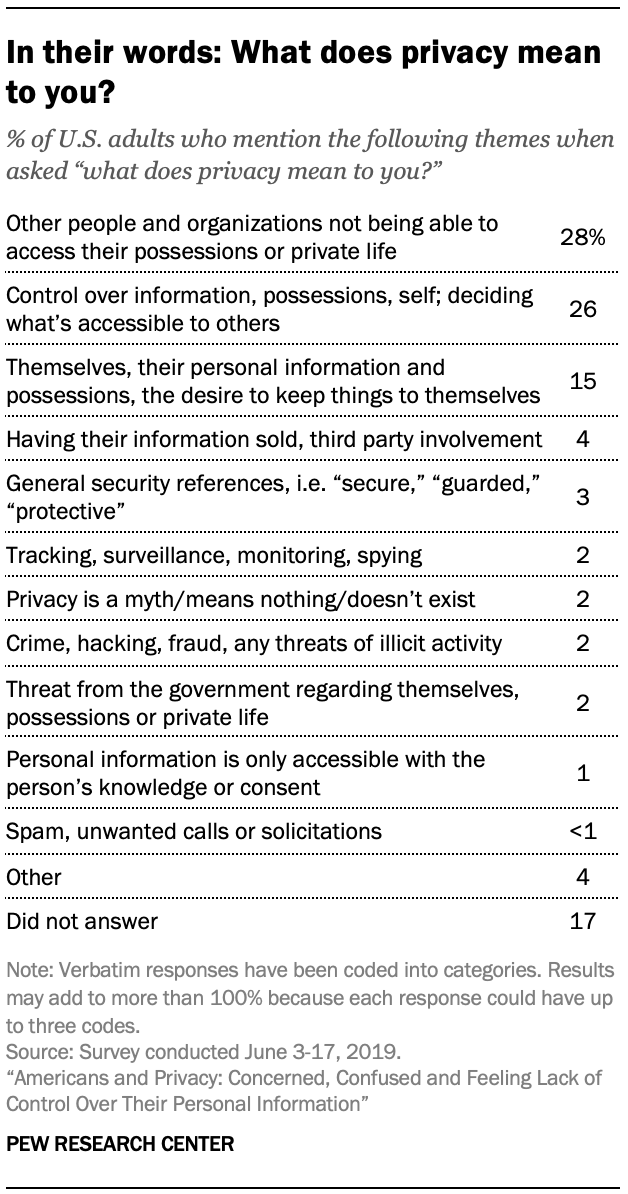
For more recent findings on data privacy, read our 2023 report “How Americans View Data Privacy.”
Americans have had a variety of ways of thinking about privacy over the centuries. Though the word “privacy” is not used in the Constitution, the idea that citizens are “to be secure in their persons, houses, papers, and effects, against unreasonable searches and seizures” is enshrined in the Fourth Amendment. Before he was a Supreme Court justice, Louis Brandeis proclaimed in a 1890 Harvard Law Review article that Americans enjoyed a “right to privacy,” which he argued was the “right to be let alone.” In a landmark birth control case in 1965, the Supreme Court embraced the Brandeis view, ruling that the right to privacy can be inferred from the First, Third, Fourth, Fifth and 14th Amendments. More modern concepts have focused on Americans’ views that they ought to be able to control their identity and their personal information.
This new survey asked Americans for their own definitions of the words “privacy” and “digital privacy.” Their written answers were coded into broad categories, and they reveal that across both questions, participants most often mention their concerns about the role other people and organizations can play in learning about them, their desire to shield their personal activities and possessions, and their interest in controlling who is given access to their personal information. By comparison, fewer participants mention third parties and the selling of their information, tracking or monitoring, crime and other threats of illicit activity, or interference from the government.
When asked what privacy means to them, 28% of respondents mention other people or organizations:
“Keeping my personal information out of the hands of the big data companies.” – Man, 34
“My personal information is secure. No one knows my credit card numbers, address info, where I have been, my banking info, my health info, etc. People don’t know anything about me I do not intend to share.” – Woman, 51
Around one-quarter (26%) mention control or their ability to decide what aspects of their lives are accessible to others:
“I have control of all my personal and financial information, no one else can access without my permission.” – Man, 50
“Personal privacy means everything about me personally is private unless I personally opt-in to allow it to be public. Opt-in means not by default or convoluted user agreement that circumvents the purpose of privacy laws.” – Man, 57
Another 15% of respondents focus on themselves and their personal possessions, without referring to outside organizations or people:
“Privacy is being able to feel like your personal information is safe.” – Woman, 18
“That I am in complete control of my personal information.” – Woman, 29
When asked about “digital privacy,” respondents again focused on similar topics as when they were asked about “privacy:” control, the role of other people and organizations, and themselves and their personal possessions. Some 17% mention only themselves and the protection of their own personal information, making no reference to other people or organizations:
“Personal information such as [Social Security numbers], banking information, medical records remain private and secure.” – Man, 59
“I should be able to surf the web and do it anonymously.” – Woman, 55
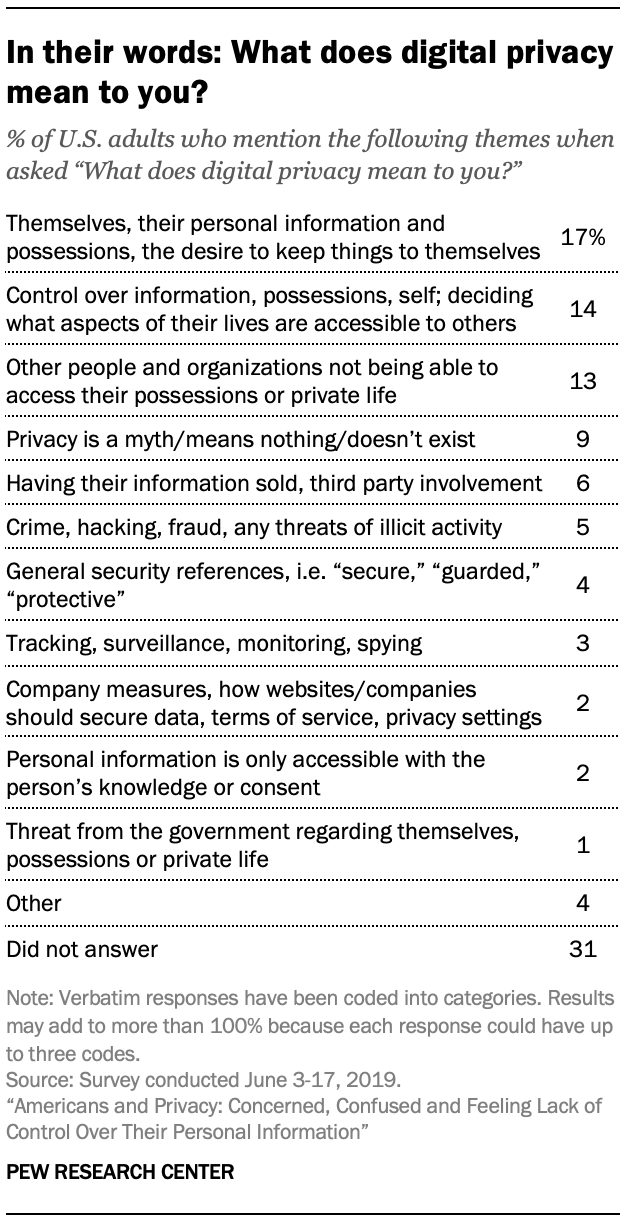
And 14% of respondents mention control and the desire to decide which aspects of their lives are accessible to others:
“Digital privacy would mean that you could use digital technology without the fear of your information or messages being vulnerable to someone gaining access to it that was not your intended receiver.” – Woman, 72
“Having control and ownership of my online data. Have control and the ability to delete information I have not explicitly given the right to use or disseminate.” – Man, 60
Another 13% mention the role other people or organizations play in their digital privacy:
“Security and lack of ability to easily find information put into the digital world like on the internet (passwords, ability to find social media posts), via phone/tablet, etc.” – Woman, 34
“Activity/data about me and from my interactions with websites and digital services being unavailable to other people.” – Man, 22
A smaller share of respondents (9%) believe that “digital privacy” is a myth and doesn’t actually exist:
“Digital privacy does not exist, in my opinion. Once one puts something on a computer that is connected to the internet, privacy is compromised and no longer ‘private.’”
– Woman, 75
“Nothing…. No matter what type of security you think you have, any hacker that wants in will get in. Just a matter of time in my opinion.” – Man, 49
Many of respondents’ written answers about their definitions of “digital privacy” repeated thoughts that were in answers about “privacy.” At the same time, words like “social media,” “online,” “internet” and “data” were more common when respondents described “digital privacy.”
Seven-in-ten Americans say they feel as if their data is less secure today than it was five years ago
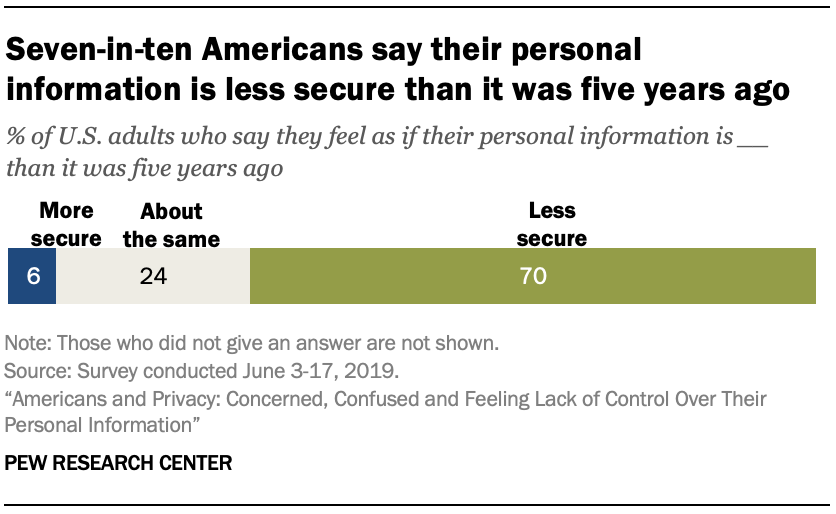
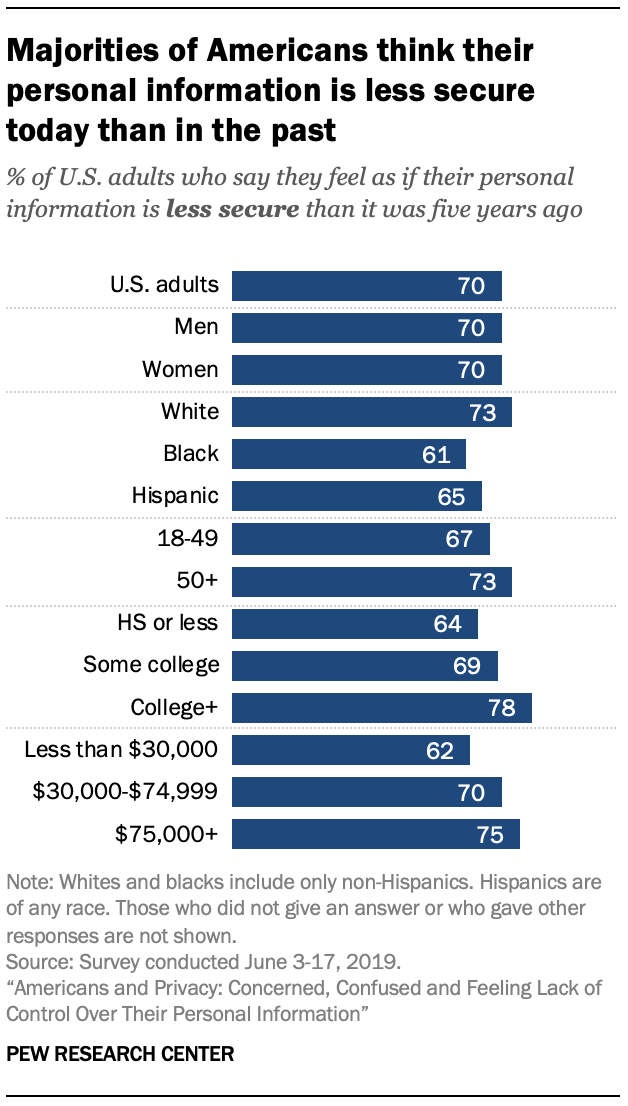
Large data breaches have become a regular feature of modern life – affecting companies like Capital One, Facebook, Equifax and Uber. To that end, Pew Research Center surveyed Americans about how they feel about their own personal data. This survey finds that seven-in-ten Americans feel their personal information is less secure than it was five years ago, only 6% say their information is more secure, and about a quarter (24%) feel the situation has not changed.
Majorities across demographic groups believe their personal data is less secure than it was in the past, but some groups are more likely to feel this than others. Those with higher levels of educational attainment are more likely to believe things are worse. Fully 78% of those with a bachelor’s or advanced degree say their personal information is less secure, compared with 64% of those with a high school education or less. Those over age 50 are also more likely to think their data is less secure, compared with those ages 18 to 49.
More than half of the public say they follow privacy news at least somewhat closely
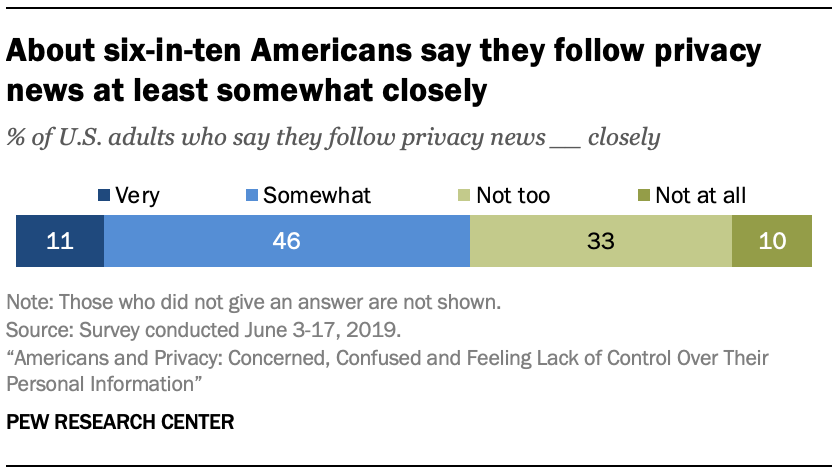
In the midst of this concern, how much attention are Americans paying to privacy issues? Some 57% of Americans say they follow news about privacy very (11%) or somewhat (46%) closely, while 43% say they don’t follow it too closely, or at all.
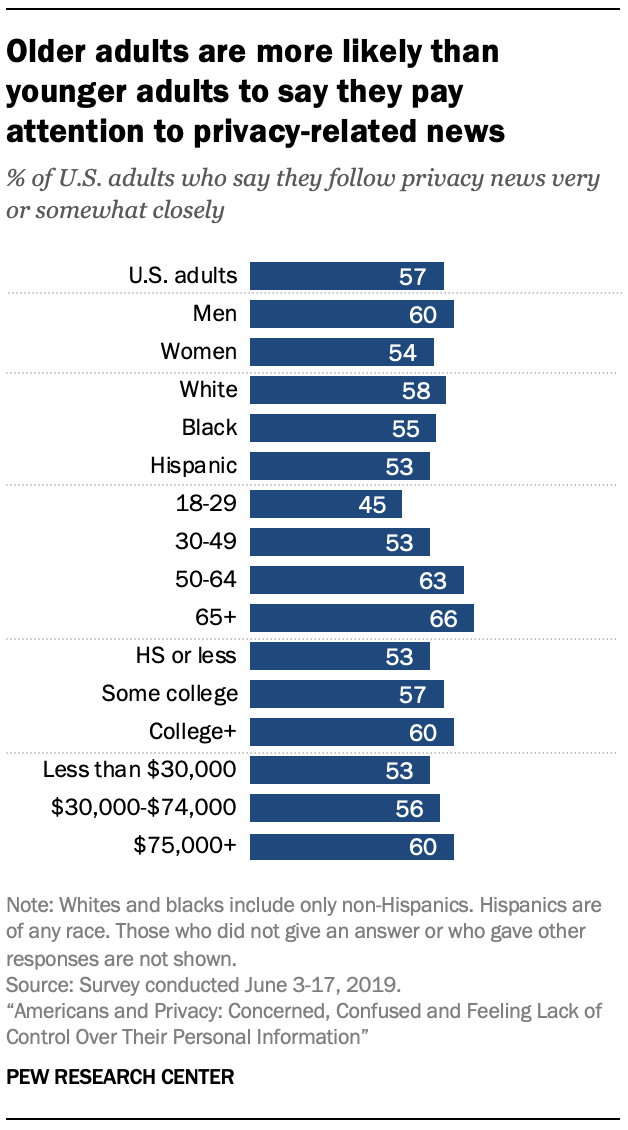
Two-thirds of adults ages 65 and older say they follow privacy news at least somewhat closely, compared with just 45% of those 18 to 29 who do the same. Those living in households earning $75,000 or more a year are also more likely to follow privacy news at the same rate – with 60% saying they do so – compared with 53% of those with a household income less than $30,000 saying the same.
There is little difference, however, between those who follow news about privacy issues and those who do not when it comes to expressing concern about the way things are trending. Some 74% of those who follow privacy news at least somewhat closely believe their data is less secure than it was five years ago and 64% of those who do not follow privacy news too closely also feel the same way.
Roughly three-in-ten Americans have experienced some kind of data breach in past 12 months
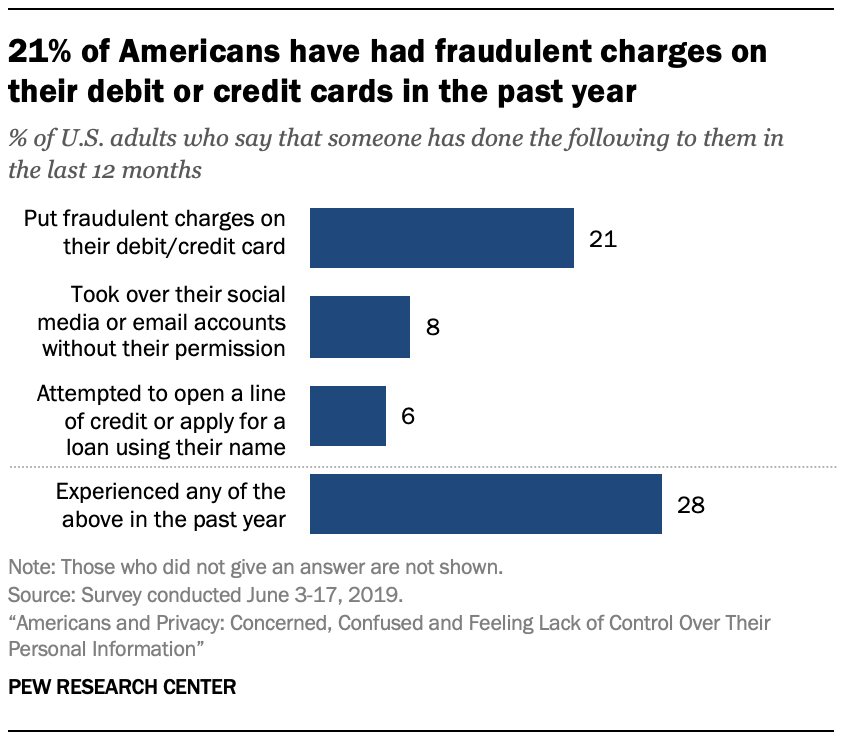
When asked about three different types of data breaches or identity theft, 28% of Americans say they have experienced at least one of them in the past 12 months. About one-in-five adults (21%) say someone has put fraudulent charges on their debit or credit card in the past year, while smaller shares say someone has taken over their social media or email account without their permission, or attempted to open a line of credit or apply for a loan using their name.
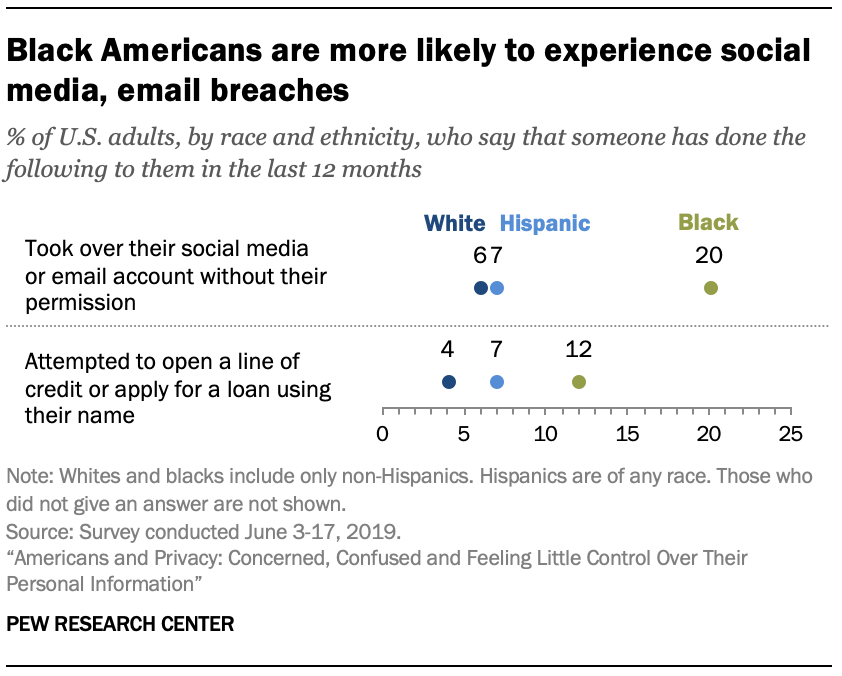
Black adults (20%) are roughly three times as likely as their Hispanic (7%) or white counterparts (6%) to say someone has taken over their social media or email account in the past year. Black Americans are also more likely to say someone attempted to open a line of credit or applied for a loan using their name in the past 12 months, compared with smaller shares of white and Hispanic adults who say the same.


